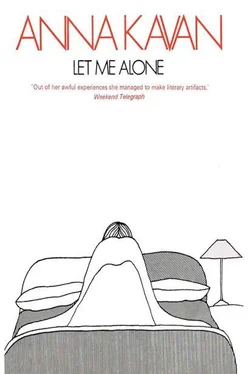Here was a great to-do. People with luggage; people with children; people angry, cheerful, flustered, calm; people in a hurry; people with nothing to do. People hung over the rail, watching what went on. Or they called out jokingly to each other. Or they stood in groups talking to their friends and getting in the way. A man on shore was playing ancient tunes on a battered old fiddle — Auld Lang Syne and out-of-date English songs, Tipperary and the old war songs — to please the English people. Occasionally someone threw him a coin over the side, and he scrambled for it with the men who sold carpets and binoculars and deck-chairs. There was a queer, unreal, excited feeling in the air.
Anna looked round for Rex Findlay. But of course she couldn’t see him. Impossible to find anyone in this confusion. She walked aimlessly towards the stern of the boat, pushing through the chattering crowd. And then she saw him, smoking a cigarette near the door of the wireless cabin, where there was a little quietude. He seemed to have found a quiet space for himself in the midst of the lively, excitable muddle.
‘So you have really appeared,’ Findlay was saying to her. She moved towards him. He stood with the cigarette drooped carelessly from the ends of his fingers, intent on the casual and yet close observation of the scene. And his mouth had the peculiar pale smile, like an emotional sign which only she could interpret. For a moment, she felt the new thrill in her blood as she looked at him, watching his mouth. She wondered what he was thinking. He spoke so unrevealingly. They stood and looked at the crowd.
‘Are you glad to be going out East?’ she asked, smiling, and glancing at his face. He took a puff at his cigarette. She watched him inhale the smoke and blow it out slowly, so very slowly, between his wide, smooth lips. Still she waited for him, and still he made no response.
‘Are you glad?’ she urged. ‘Do you want to go?’
He shrugged his shoulders this time: and contracted the corners of his mouth in a dubious way. Then he went back to his irresponsible, rather roguish smile.
‘It gives one to think. It gives one furiously to think,’ he said, looking round at the people.
‘It does indeed,’ laughed Anna. And she too threw bright glances of mockery at their fellow-passengers. She understood that he was disparaging them.
The muddle on board sorted itself out by degrees as the voyage began. But the boat was very crowded, so there still remained a certain confusion. Naturally, the chief steward had a down on Matthew and Anna. He was able to inflict on them various minor discomforts. Owing to the number of passengers, meals were served in two relays: the Kavans were drafted into the second division amongst the young bachelors and the less important folk, where the food was always scrappy and cold. And they were obliged to sit at an inferior table, right at the edge of the saloon. These things annoyed Matthew exceedingly. He took them as so many direct insults, aimed at him, personally; which, in a way, they were. And he went about in a fever of resentment, airing his grievances on every occasion, suitable or not.
The weather was rather bad at first. Anna felt that all her life she would remember the cold, grey, heavy weather, the weird, purgatorial existence on the slowly heaving ship, evening coming on, and the cold vista of deck — like a nightmare hospital ward — with rows of prone, shrouded figures, and someone passing and passing, lurching and staggering as from a wound. There was a bull on board, travelling in a great crate near the stern. And the smell of this animal, and of its sickness, and the look of its evil, reddish eye, inflamed with insane, villainous resentment, peering out of the wooden crate under the shock of shaggy, curly hair — so like a certain type of man — were also things that she would never forget.
As they neared Port Said the storms cleared off and the sun came out again like a god stepping up the sky, stepping out of the heavily-heaving waves. The spirit of the ship changed. From being a hospital ward the deck became a playground. Children ran and shouted everywhere. There was a feverish outburst of dancing and deck games.
Matthew and Anna went ashore with the Bretts and a number of other acquaintances whom Matthew had collected. A new side of Matthew’s character had been appearing lately on the ship. He had come out as a social success. Perhaps ‘success’ is rather an over-statement. But he certainly seemed to get on very well. Especially with the ladies. There was something of the ladies’ man about him, now that he was with his own kind — really rather lady-killing. But all perfectly innocuous, unexceptionable. He never went further than a sort of chaste badinage, touched now and then with just a trace of wistfulness. He was like a polite schoolboy, so cheerful and neat and nicely mannered, hanging round the ladies and feeding on the sweets of their appreciation. He fetched books and cushions for them, played games with them and allowed them to win, told innocently naughty stories that made them giggle, and played with their children. All this without losing for a moment his strange, stiff, wooden inhumanness. And occasionally, just once in a while, he allowed the pathetic look of reverence to appear; so appealing. He did so love the maternal, Madonna quality in a woman, which Anna, of course, conspicuously lacked. He wanted to bow down and worship it. And the ladies were all in a flutter of motherliness over him.
With the men he didn’t get on quite so well. He tried to be a jolly good fellow, and drank with them in the bar. But it didn’t quite go down. There was always a false note ringing somewhere. His fellow males rather edged away from him, not hostile exactly, but faintly contemptuous, as though they despised his methods. Perhaps they thought him unmanly.
And Anna, a regular fish out of water, watched all these goings-on with straight, astonished eyes, feeling thoroughly lost.
She was a bit disappointed herself over young Findlay. She had hoped so much from him in a vague, indefinite, untranslatable way. But nothing materialized. She saw quite a lot of him. He lent her books and sat beside her and walked with her; the endless, monotonous prowl round and round the deck. He was charming and amusing. But elusive. They never seemed to get any further.
And, most disheartening aspect of the case, he seemed quite unaware that there was any further to get. He was perfectly happy just strolling and chatting carelessly with Anna. But she felt any other fairly intelligent, fairly attractive girl would have done equally well.
However, Rex Findlay came ashore with them at Port Said. He was a little bit eccentric in his dress, going about without a coat in his soft woollen cardigans, smoky blues, and russets, so soft and close, like a bird’s plumage, now that the weather was warmer. The strait-laced matrons and the formal, stiff-collared Britishers turned up their noses.
‘So slovenly,’ they murmured. And thought it bad for British prestige. If his dress was casual his morals probably were too — so they implied.
The young man himself was rather amused. Of course, he was quite aware of the general opinion. And equally, of course, he didn’t care a straw. Like a tall, elegant bird, with his firm, smooth, smoke-coloured breast, he stepped delicately up and down, amongst the drab, conventional flock. He decked himself out, when he felt inclined, and carelessly flaunted his soft-toned splendours, rather like a high-stepping, whimsical bird.
Upon Port Said a bright sun shone. Anna went ashore pleased and smiling. Findlay walked beside her. They were all dining together. How firm, how pleasant was the solid land! In the warm African winter sunshine she went ashore, to the noisy, vivid town, she smelled the East and felt the quality of the sun, the faces thronging about were dark and fantastic, everywhere was the intense novelty of a new continent, full of unexpected sights and sounds. She sensed the proximity of the East, it seemed to await her with heavy significance behind the town. In the dusty air came the strange suggestion, the light was the winter outpouring of a fiercer sun, the crude scarlets and blues and the white dazzle of walls were the fringes and decoration of a gayer and more exotic garment.
Читать дальше












